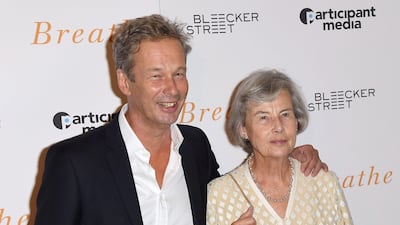Paralysis and forced assisted breathing are no joke but for Robin Cavendish, legendary disability campaigner, laughing in the face of his polio affliction was the only way to live “an incredibly rewarding and joyous life”.
Robin is the real-life protagonist of the movie Breathe which tracks his battle with polio after being given just three months to live at age 28.
Produced by his son Jonathan, the film depicts the way both Robin and his family dealt with his paralysis from the neck down, which also made him reliant on a mechanical ventilator to breathe.
“Growing up in it was surprisingly normal because I didn’t know any different,” said Jonathan, a 58-year-old Briton.
“My father got ill before I was born and he had a period of very severe depression in hospital which I don’t remember. When he came out, he put that behind him so I knew an environment where everything was very happy. My parents were brilliant at laughing disaster in the face in a way and my life was very much like the life depicted in the film.”
Despite his father living within minutes of death at all times, Jonathan said his parents never made him aware of the gravity of the situation.
“They were able to, by force of their own love and people’s friendship, to live an incredibly rewarding and joyous life,” he said.
“We wanted it to be an entertaining film but above all, it’s very loyal to the fact and the spirit of the way my parents lived and I wanted to show what can be done with willpower and love to overcome the most extreme adversity.”
Jonathan said his daily trials today seem mundane when he compares them to his parents’ modesty and self-deprecation. “They didn’t really think what they did was extraordinary but rather how anybody would react,” he said. “I met a lot of disabled people through my father and some fared less well.”
At age 64, Robin elected to stop his ventilator.
"As soon as he proposed this to my mother and I, our initial reaction was to reject it but very quickly, we realised that he was absolutely making the right decision," Jonathan said.
“His entire life was about attaining a quality of life after disability and he decided because of the wear-and-tear on his body – he was failing and losing his health – but also the terrible bleeds he was having were going to very likely kill him in a very unpleasant way or another, this decision allowed us to say goodbye to him over time,” he said.
“It was all very joyous, civilised and a very lovely period oddly enough and I would hugely support that process.”
Jonathan said he hopes Breathe will bring awareness to younger generations who, thankfully, have less experience with polio.
_______________
Read more:
A war that killed millions could soon be over, but an even deadlier conflict is still being fought
National Editorial: The fight against polio is not over yet
_______________
“Many of those [hit] by big polio epidemics in the 1950s are no longer around,” he said. “My 21-year-old triplets don’t know much about it and they never met their grandfather so the film was very instructive.”
Only 12 cases of polio have been registered across the world this year, according to the World Health Organisation.
“After 30 years of trying to eradicate it, there’s not very much left in the world,” said Chris Maher, manager of the organisation’s polio eradication programme in the eastern Mediterranean region.
"The main concentration of the wild polio virus is in Pakistan and Afghanistan, within our region, and Nigeria due to climatic reasons, population density, conflict and difficulty in accessing immunisation for the population."
He said eradication was simple in principle but far more difficult in practice. "You have to engage communities to support their children being immunised, vaccinators need to be motivated and engaged in the community and enough money to pay for the vaccines and operations," Mr Maher said.
The hope is to completely eradicate the disease by year end or early 2018.
“Gulf countries have been pretty big supporters almost since the beginning,” he said. “The primary role is providing funding and resources but they’ve also had a pretty strong advocacy role within the region with governments, promoting the idea of immunisation against polio. The UAE itself has committed over 100 million dollars to global polio eradication just in the last six to seven years and we’re very hopeful that the Gulf’s active role will continue.”
- Front Row Filmed Entertainment's theatrical release of The film will be on November 23

